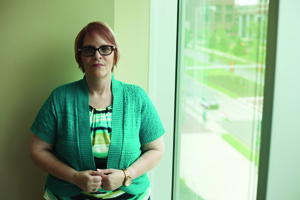Photo by Drew Crenshaw/Staff Reporter
Tarana Burke, activist, #MeToo founder and sexual assault survivor, spoke at the Alys Stephens Center, October 9.
She was first a victim of sexual assault when she was six years old, and again in her early teenage years. At the time, the words she searched for surpassed the ones she knew as a young girl. Years later, Tarana Burke became the spokesperson and face of one of the biggest sexual assault awareness movements in history.
“What I want for young women and at the same time all survivors…is that they feel safe and not vulnerable in their communities,” Burke said. “That they have the voice to say ‘This is what I need’ and for people to respond to that need as opposed to what they’ve decided what they need.”
#MeToo began in 2006 as a campaign to empower girls and women of color who had been victims of sexual violence. Burke has since made a career of educating and empowering those who have been impacted by sexual violence. Starting in her teens, Burke became an advocate for human rights, creating programs to help young girls in marginalized communities.
Her internationally acclaimed movement, #MeToo, came to be when she was left speechless as a young girl told her she had been sexually assaulted. In this definitive moment, Burke wished she had found the words to say “me too.” Burke spoke at the Alys Stephens Center on Tuesday, Oct. 9, in part of UAB’s Institute of Human Rights (IHR) fall lecture series which includes a lineup of champions for human and civil rights. As MeToo has gained more prominence, its original message has been left distorted, according to Burke.
Many believe the movement is solely about taking down powerful men in Hollywood or ruining the lives of brothers, sons and husbands. Burke dismisses these claims, saying the movement is truly about survivors of sexual violence moving forward with their dignity still intact.
“Don’t be distracted by the media,” she said. “Don’t let other people tell you who this is for or what it’s for. You know in your heart what it’s for. You are the movement.”
In light of the Brett Kavanaugh sexual assault allegations and Bill Cosby’s prison sentence, many have had trouble visualizing these men as rapists based off their character at face value. Cosby was seen as “America’s Dad” from his beloved role in the TV series “The Cosby Show.” Kavanaugh was known for being a trusted political figure from his work as a US Circuit Judge. Burke said she feels that it is best for people to learn to diverge the person from the image they present if said person were to face allegations of sexual violence.
Mandy Parente, M. Ed. UAB’s Interpersonal Violence Prevention Coordinator, said she praises the Me Too movement for how it has changed the way sexual assault is discussed.
“I think that MeToo has been instrumental to the work of interpersonal violence prevention, not only here at UAB but also around the world,” she said. “The shift in the way that folks engage in conversations about sexual violence has been extraordinary.”
Parente added that students, faculty and staff should be aware of the policies and laws that protect them and encourages those within UAB’s community to learn more about resources available to them. As the closing statement, Burke invited listeners to put forth work in the fight against sexual violence. Her wish is that those who were present that evening exercise their agency in eradicating injustices faced by survivors of sexual assault.
“Anytime I come to have a community conversation, my ultimate goal [is]…for people to come away with real understanding of what the movement is and where it came from and what our goals are moving forward,” Burke said. “We have a unique historical opportunity right now and if we don’t change how we talk about it, we’re going to lose it.”

 Individuals protest the MRA in front of O'Henry's Coffee in Homewood. (Photo Ian Keel).Erica Webb - Opinions Columnist
Individuals protest the MRA in front of O'Henry's Coffee in Homewood. (Photo Ian Keel).Erica Webb - Opinions Columnist Debbie Morgette. Photo by Spencer PortisSarah Faulkner - Editor-in-Chief
Debbie Morgette. Photo by Spencer PortisSarah Faulkner - Editor-in-Chief